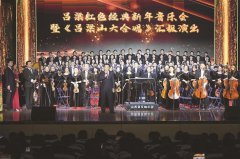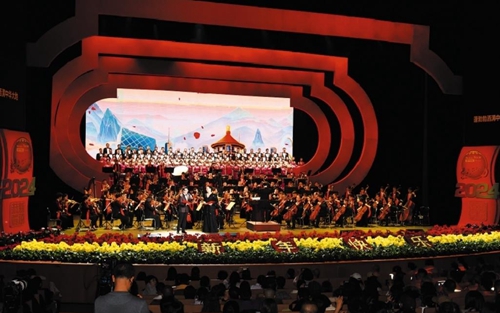2020世界戏剧日致辞:戏剧是一座圣殿
2020-03-27 发表|来源:山西戏剧网|作者:晋戏宣每年的3月27日是世界戏剧日,今年的戏剧日有着不同一般的意义。当下世界许多国家正在全力抗击威胁人类的突发疫情,尽管疫情使剧院关闭,演出终止,但全世界戏剧人的共识依然坚定:疫情是人类共同的敌人,戏剧是我们共同的理想!虽然剧院的大门暂时是关闭的,但戏剧人的心是永远敞开的;戏剧艺术对建设人类文明,增进各国、各民族的理解友爱具有重要作用。
今年来自巴基斯坦著名剧作家、阿霍卡剧院的负责人沙希德·纳迪姆发表了2020世界戏剧日宣言。
致辞人:沙希德·纳迪姆|Shahid NADEEM
阿霍卡剧院刚刚演出完苏菲诗人布拉赫·沙阿的作品,一位老人便领着一个小男孩儿来到扮演伟大的苏菲诗人的演员面前:“我的孙子病得厉害, 求你给他做个祷告吧。”演员一愣,说道:“我可不是圣人布拉赫·沙阿呀,我只是扮演他的一个演员!”老人说:“孩子, 你不是演员, 你是布拉赫·沙阿的转世,是他的化身(Avatar) ”。霎时间,我们顿悟出一个全新的戏剧理念:演员不再是表演一个角色,而是他/她所塑造角色的化身。
在许多文化中都能找到类似布拉赫·沙阿这样的故事,探索这些故事可以为我们这些戏剧工作者和那些虽不熟识但热情洋溢的观众之间搭建一座桥梁。在从事舞台表演时,我们时常会被自己的戏剧哲学和引领社会变革的责任所误导,而将普罗大众放在脑后。在我们全情投入来应对现实挑战时,我们却忽视了戏剧可以提供的深入感人的精神体验。
当今世界,偏执、仇恨、暴力不断升级,整个星球正越来越深地陷入气候灾难之中,而这正是我们需要补充精神力量的时候。我们必须向冷漠无情的人宣战,向悲观厌世的人宣战,向贪婪无度的人宣战,向不尊重我们所居住的地球的人宣战!
戏剧有一种崇高的作用,它可以激励、动员人类摆脱滑向深渊的堕落,它可以撑起舞台和演出场地,把剧场变成一座圣殿!
在南亚,演员在登上舞台之前会满怀敬意地先触摸一下地板,这是一个由精神和文化相互交融而产生的古老传统。现在已经到了重新来确立演员与观众、过去与未来的共生关系的时候了。戏剧创作可以是一种神圣的行为,演员可以实实在在地成为他们所扮演角色的化身。剧场可以成为神社、神庙、圣殿,而神社、神庙、圣殿则可能成为演出的空间。
英-中译者|张鹤馨
*苏菲主义:伊斯兰教一个神秘教派,苏菲诗歌,主 要以音乐形式来呈现,通过对世俗爱情的隐喻来表达神秘的结合。
*布拉赫·沙阿: 一位很有影响力的旁遮普苏菲诗人,他用通俗的语言写下复杂的哲学话题,因其强烈批评宗教正统派的言论,被指控为异教徒,并被拒绝下葬在城市墓地。
* 阿凡达(Avatar): 根据印度教文化,阿凡达是神师在地球上的转世或显灵。
------------------------------------------
Theatre as a Shrine
At the end of a performance of Ajoka Theatre’s play on Sufi Poet Bulleh Shah , an old man, accompanied by a young boy, came to the actor playing the role of the great Sufi, “My grandson is unwell, would you please blow a blessing upon him.” The actor was taken aback and said, “I am not Bulleh Shah, I am just an actor playing this role.” The old man said, “Son, you are not an actor, you are a reincarnation of Bulleh Shah, his Avatar (4)”. Suddenly a whole new concept of theatre dawned upon us, where the actor becomes the reincarnation of the character, he/she is portraying.
Exploring stories such as that of Bulleh Shah, and there are so many in all cultures, can become a bridge between us, the theatre-makers and an unacquainted but enthusiastic audience. While performing on stage, we sometimes get carried away by our philosophy of theatre, our role as harbingers of social change and leave a large section of the masses behind. In our engagement with the challenges of the present, we deprive ourselves of the possibilities of a deeply moving spiritual experience that theatre can provide.
In today’s world where bigotry, hate, and violence is on the rise, our planet is plunging deeper and deeper into a climatic catastrophe, we need to replenish our spiritual strength. We need to fight apathy, lethargy, pessimism, greed, and disregard for the world we live in, the planet we live on. Theatre has a role, a noble role, in energizing and mobilizing humanity to lift itself from its descent into the abyss. It can uplift the stage, the performance space, into something sacred.
In South Asia, the artists touch with reverence the floor of the stage before stepping onto it, an ancient tradition when the spiritual and the cultural were intertwined. It is time to regain that symbiotic relationship between the artist and the audience, the past and the future. Theatre-making can be a sacred act and the actors indeed can become the avatars of the roles they play. Theatre has the potential of becoming a shrine and the shrine a performance space.
(1) Sufism: The Islamic mystical tradition, Sufi poetry, mostly rendered in music, expresses mystical union through the metaphors of profane love. 2) Bulleh Shah (1680-1757): An influential Punjabi Sufi poet, who wrote about complex philosophical topics in simple language, a strong critic of religious orthodoxy accused of heresy and denied burial in the city graveyard. Popular across religious divide. (3) Avatar: Reincarnation or manifestation on Earth of a divine teacher according to Hindu culture.
------------------------------------------------------------------








 吕梁红色经典新年音乐会暨《吕梁山大合
吕梁红色经典新年音乐会暨《吕梁山大合 2023年山西戏剧百事记
2023年山西戏剧百事记 “任跟心名家艺术工作室”揭牌仪式暨传
“任跟心名家艺术工作室”揭牌仪式暨传 大同市2024新年音乐会精彩上演
大同市2024新年音乐会精彩上演 孙业礼任文化和旅游部部长 胡和平不再担
孙业礼任文化和旅游部部长 胡和平不再担

 晋公网安备14010902001572
晋公网安备14010902001572